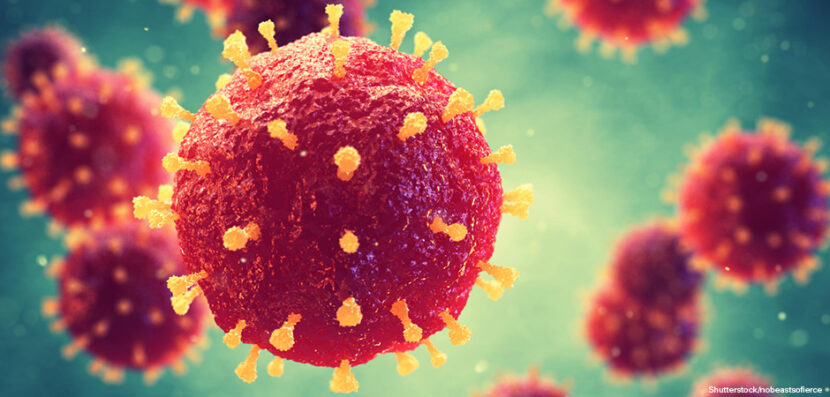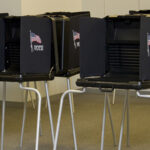- Current Events Nebraska Rejects Winner-Take-All Proposal
- Citizenship Voting Under Age 18
- Citizenship Citizenship in Action
- Democratic Party Biden’s and Trump’s Recent Primary Results
- Elections Trump and Biden Win South Carolina and Michigan Primaries
- Democratic Party Trump and Biden Win Big in Early February Contests
COVID-19: What is the Government’s Role?
Depending on where you live in the country, the impact you are feeling from the novel coronavirus (COVID-19) outbreak is likely to range from inconvenience to a total lifestyle change. That’s because the federal, state, and even local governments are all racing to try to contain the spread of the virus and keep their citizens safe.
But what are governments allowed to do that won’t also trample too much on peoples’ personal freedoms? It’s a complicated issue. Here, Election Central takes a look at some measures that have been taken or proposed so far.
Travel Bans
Last week, the president announced a travel ban from 28 European countries, including the United Kingdom. This is in addition to the 26 countries already banned as a result of the coronavirus. The goal of a travel ban is to help limit the movement of the disease into and out of the United States. Most other countries have instituted similar bans. The European Union has banned all “non-essential” travel for a period of thirty days. Australia and China are requiring everyone who enters their country to automatically self-quarantine for two weeks. Canada is refusing entry to anyone who isn’t a Canadian or U.S. citizen.
Controlling Corruption
Governments have the right to file lawsuits against anyone taking illegal activity to profit from the COVID-19 crisis. For example, the state of Missouri has filed a restraining order against Jim Bakker, a televangelist who claimed to be selling a cure for the virus called “Silver Solution.” (To be clear, there is currently no cure for coronavirus. Scientists and health agencies around the world are working quickly to test a vaccine that will be mass-produced and distributed when it is safe and ready for use.) Bakker’s actions are in violation of both state and federal law. The federal Food and Drug Administration has also sent warnings to six other companies nationwide that claim to be selling cures for the virus.
Another legal issue to consider is price gouging, which means artificially inflating the prices of items that are highly in demand right now, such as toilet paper and hand sanitizer. While supply-and-demand is a normal economic process–meaning that things which are scarce are more expensive than things which are common–excessive price gouging (especially when it is done during emergencies) is illegal. The attorneys general of several states have already issued warnings to businesses about engaging in this practice.
Controlling the Spread
The government can’t tell you where to go or what to do, right? In this set of circumstances . . . wrong.
Once the government declares a national state of emergency, it gains broad powers in terms of being able to control peoples’ behaviors, such as instituting curfews and quarantines. So far, here in the United States, no significant nationwide action has yet taken place, although many state and local governments have taken steps to limit the movement of people in public spaces.
Ohio Governor Mike DeWine has been one of the first to institute policies such as closing all universities, public schools, restaurants, and bars indefinitely, as well as postponing the primary election that was supposed to take place there on March 17. New York Governor Andrew Cuomo has totally closed down a one-mile “containment area” in a suburb called New Rochelle, and deployed the National Guard to deliver food and help with the cleaning of public spaces. Meanwhile, residents of San Francisco have been ordered to “shelter in place”–meaning not leave their homes except for groceries and doctor visits–until at least April 7.
Many public health experts have been critical of the president and federal government’s lack of response on a nationwide level.
Provide Funding
Last week, the president signed into a law a significant coronavirus funding package. The federal government will spend $8.3 billion to purchase additional medical supplies; research and purchase potential cures; fund community health centers; staff medical labs and health departments; and provide aid to other countries.
In addition, House Democrats proposed an additional federal funding package which would provide free coronavirus testing; expand unemployment benefits; supply additional funding for food banks; increase family and sick leave for those who become infected; allow six months of loan forgiveness on federal student loans; provide disaster grants for communities; and provide direct financial assistance to businesses at risk of failing because of the outbreak. However, due to opposition, the bill is currently on hold. Unfortunately, the House is now on recess, and the Senate is unable to look at the bill for procedural reasons.



